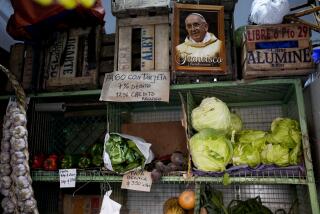A ‘Currency’ Born of Argentina’s Crisis
- Share via
SALTA, Argentina — The bills look a bit like real Argentine pesos but of a cheaper quality. Imagine a copy of a dollar made by a laser printer--the ink fades if you leave it in your wallet too long.
The funny money has become a de facto currency here and in many other corners of this troubled country.
They are federal bonds, issued, as the fine writing on the back says, as a result of “an administrative, economic and financial emergency.” They have flooded the city, filling up cash registers at the supermarkets, gathered up in large wads in the pockets of newspaper vendors and taxi drivers.
This week, the provincial bonds are at the center of tense discussions between the Argentine government and visiting representatives of the International Monetary Fund. The two sides are hoping to hammer out an agreement that will help rescue Argentina from its economic abyss and avoid another round of defaults on its $141-billion public debt.
Near the top of the IMF agenda is the removal of 14 different provincial bonds from circulation. Provincial bonds now constitute about one-third of the currency in use.
The bonds, IMF representative Anoop Singh told reporters in Buenos Aires on Wednesday, “have worsened the economic crisis, increased the risk of inflation and lowered confidence in the structure of public finance.”
But officials in Salta and other provinces say they wouldn’t be able to pay their bills--and hundreds of thousands of employees--without them. The bonds are the product of a long-running standoff between the federal government and the provinces over the distribution of an ever-shrinking pie of tax revenue.
Under pressure from the international financial community to reduce government spending, federal authorities sharply cut outlays to the provinces during the last four years. Tens of thousands of government workers have been laid off. But when many of Argentina’s governors finally insisted last year that they couldn’t cut any further, the government printed the Letters of Cancellation of Provincial Obligations--lecops for short.
Other provinces have issued their own currencies to help cover their budget shortfalls. Tucuman issues the bocade, and Formosa the bocanfor. The most widely circulated is the patacon printed by Buenos Aires province.
In Salta, the beginning of each month sees a flood of lecops as provincial workers cash their paychecks. People who buy goods in pesos are apt to receive lecops as change. By law, provincial businesses must accept lecops. But the bonds are not necessarily worth anything in other Argentine cities.
“If you try to spend them in Buenos Aires, no one will take them,” said Luis Schuller, a tour operator in the community of San Lorenzo, near the city of Salta, the provincial capital.
The situation doesn’t sit well with Juan Carlos Romero, the governor of Salta province.
“These bills aren’t our paper,” said Romero, who is considering running for president in the election scheduled for next year. “It’s paper that the federal government is going to have to replace with real money one day.”
Still, given the choice between getting lecops from the federal government or getting nothing at all, Romero said, “we’ll take however many lecops they want to give us. And I think any province would.”
On Thursday, Romero was in Buenos Aires to meet with other governors negotiating with the federal government and the IMF team led by Singh. Provincial governments will have to reduce their collective deficits by 60% as a condition for further IMF loans, Singh said.
Many governors are balking at the cuts. But they seem inevitable, given the sharp drop in tax receipts, which were down 30% in March compared with last year.
“If the economy doesn’t start growing, if tax revenue doesn’t start going up again, then we are going to enter a period of profound crisis, a collapse,” Romero said. “And that will have very grave social consequences.”
Singh is set to leave for Washington this week. He said an IMF team will return to Argentina to finalize the terms of a loan--but only if the organization’s conditions are met.
More to Read
Sign up for Essential California
The most important California stories and recommendations in your inbox every morning.
You may occasionally receive promotional content from the Los Angeles Times.














